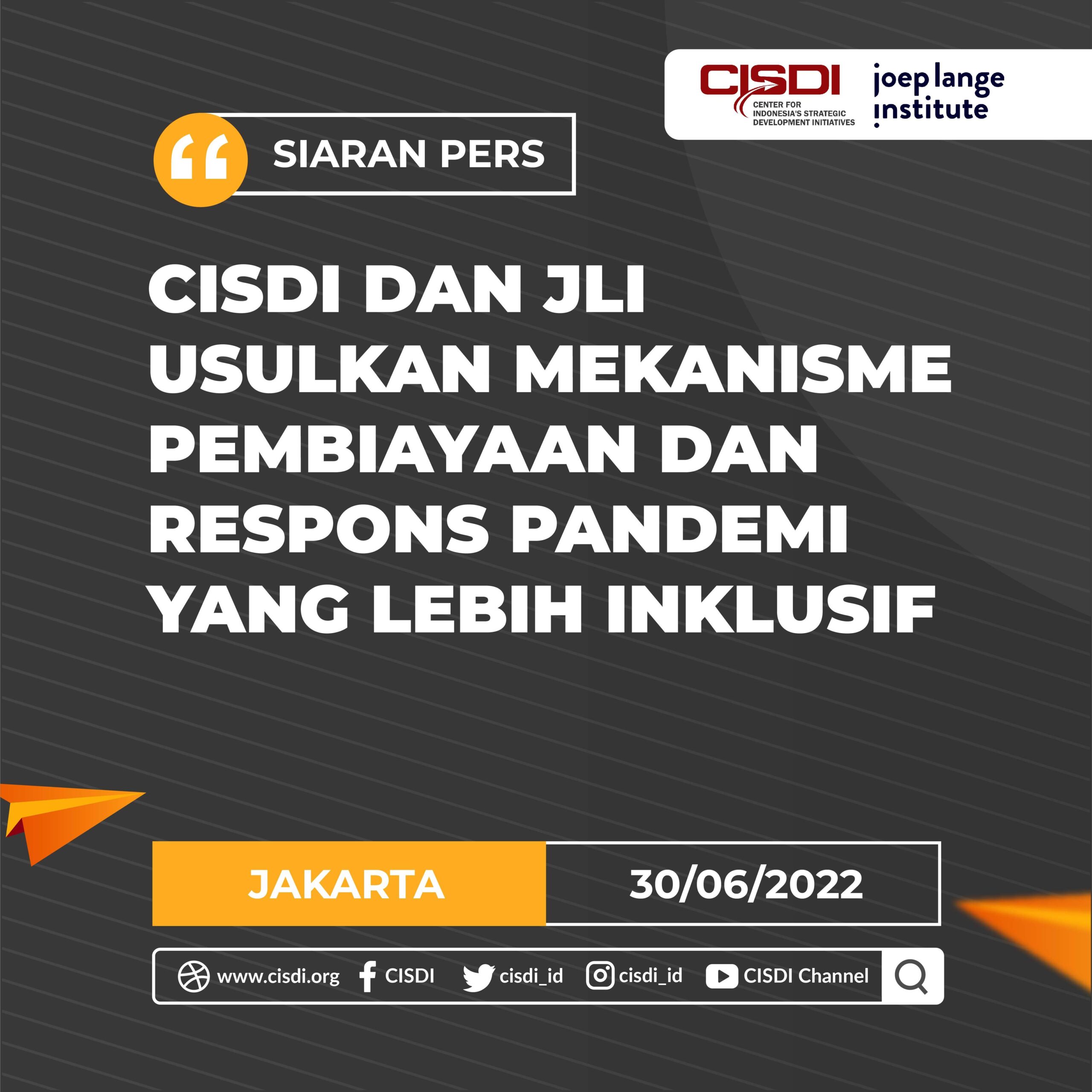
Press Release
CISDI and JLI Propose a More Inclusive Pandemic Financing and Response Mechanism
CISDI Secretariat • 28 Juni 2022
The Financial Intermediary Fund, FIF, that was initiated by the World Bank is considered to have some problems in inclusivity. The Center for Indonesia’s Strategic Development Initiatives (CISDI) and The Joep Lange Institute (JLI) explains how the financial arrangements can potentially repeat the pattern of global health financing that depends on donors, minimal participation of civil society organizations, and is not inclusive and sustainable.
Thus, CISDI and JLI recommend FIF to create a new paradigm by applying the principles of Global Public Investment (GPI).
The Research Team welcomes FIF as a global funding mechanism in dealing with pandemics. Moreover, FIF was built from Indonesia's leadership as President of the G20. As we are passing the response phase and the world's entry into the phase of ensuring the readiness of the health system in a pandemic – both to get out of the current pandemic and to face the next pandemic – requires world solidarity in ensuring the availability of adequate, fair and sustainable financial resources," said Diah Saminarsih, Advisor Senior Gender and Youth Affairs for WHO Director General and Founder of CISDI, and co-authors Simon Reid-Henry, Jon Lidén, Christoph Benn, Olivia Herlinda, and Maria Fernanda Bustos Venegas, as featured in the article in The Lancet.
The FIF is a form of trust fund that was intended as an effort to close global financial gaps in efforts to prevent, prepare for, and respond to pandemics. However, the initial proposal of the FIF stated that the approach used will not be much different than the previous one, that low-middle economic countries, civil society, and communities will be given minimum participation as well as imbalances in power and decision-making in donor and recipient countries.
The GPI is believed to change the funding mechanism, in which countries of all income groups can be involved in financing FIF, in particular low and middle income countries, through domestic spending adjusted based on a country's gross national income for global pandemic prevention, preparedness and response each year.
“However, ensuring execution at the national to community level requires new innovations in governance. The GPI principle is a public funding approach that emphasizes the aspect of fairness. In GPI, all countries can and are expected to contribute, receive benefits, as well as be involved in decision making," they said.
“The pandemic prevention, preparedness and response financing reforms needed now must focus on the needs of countries from every income level. and encourage meaningful participation. It includes participation of civil society as well as expanding opportunities for contributions from other countries,” they added.
The GPI will increase the transparency level of how countries and their health systems will benefit and ensure sustainability of the financing. Also, the member countries can also formulate their own needs for a pandemic preparedness component, so that the process of channeling funding for pandemic prevention, preparedness and response will be more transparent and accountable.
Moreover, GPI will also promote inclusion of all development actors. Not only does it ensure the accumulation of funds from as many countries as possible, but also build global solidarity through formal representation of various development stakeholders, including low-and-middle- income countries and civil society organizations. Civil organizations have also been proven to be an important part of decision making in FIF as they strengthen the capacity of the community for pandemic prevention, preparedness and response to advocacy at the sub-national and national policy levels.
Thus, CISDI and JLI encourage all countries attending the World Bank Board Meeting on FIF on Thursday, 30 June 2022 to promote the GPI principles to be adopted as the main principles in FIF governance.
Notes: Journalists who wish to quote this press release for coverage purposes, please include in the anchor text the following link: https://www.thelancet.com/journals/lancet/article/PIIS0140-6736(22)01239-9/fulltext
About CISDI
Center for Indonesia's Strategic Development Initiatives (CISDI) is a non-profit organization that encourages the implementation of scientific evidence-based health policies to realize an empowered, equal, and prosperous Indonesian society with a healthy paradigm. CISDI conducts advocacy, research, and program management to realize transparent, adequate, and equitable governance, financing, human resources, and health services.
About The Joep Lange Institute
The Joep Lange Institute (JLI) is an international organization that promotes and facilitates global health innovation. Inspired by the life story and work of Dr. Joep Lange. JLI combines science, activism and pragmatism to achieve their ultimate goal: promoting inclusive and humane access to health in countries that are not yet able to optimally provide access to their people.
.png)